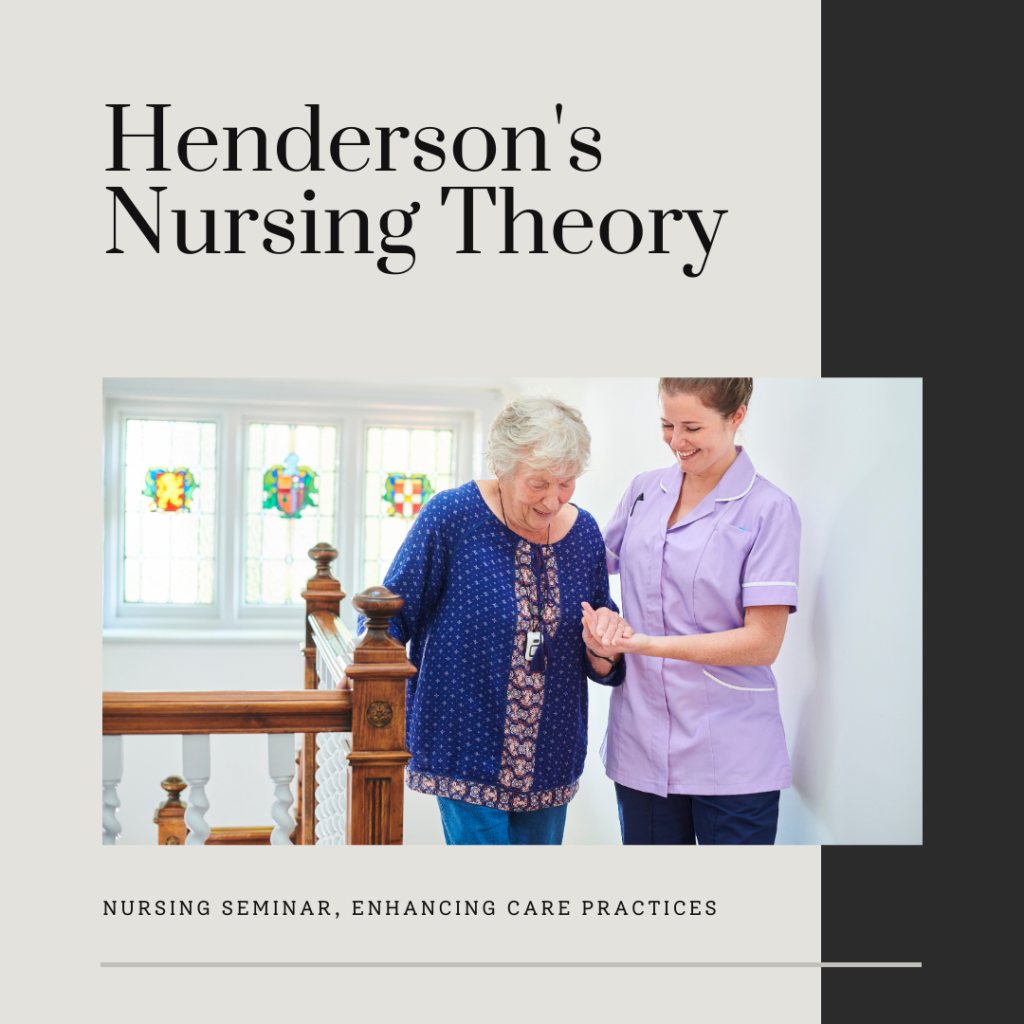Virginia Henderson’s Need Theory
Introduction to Virginia Henderson’s Need Theory
Overview and Significance
Virginia Henderson’s Need Theory is a foundational nursing model that emphasizes the importance of addressing patients’ basic human needs to promote health and well-being. Henderson identified 14 fundamental needs that nurses must assess and meet to provide effective care. Her theory highlights the role of nurses in helping patients achieve independence and supporting them when they are unable to care for themselves.
Historical Context
Henderson developed her Need Theory in the mid-20th century, drawing from her extensive experience in nursing education and practice. Her work aimed to define nursing’s unique function and differentiate it from other healthcare professions. Henderson’s theory has since become a cornerstone of nursing education and practice worldwide.

Key Principles of Henderson’s Need Theory
Fundamental Needs
Henderson identified 14 fundamental needs that encompass physical, psychological, social, and spiritual aspects of health. These needs range from basic physiological requirements, such as breathing and eating, to higher-level needs, such as achieving a sense of accomplishment.
Nurse’s Role in Meeting Needs
According to Henderson, the primary role of the nurse is to assist patients in meeting their needs when they are unable to do so themselves. This involves providing care, education, and support to help patients regain independence.
Independence and Interdependence
Henderson’s theory emphasizes the importance of promoting patient independence. Nurses should aim to support patients in becoming as self-sufficient as possible while recognizing the value of interdependence in the nurse-patient relationship.
Components of Henderson’s Need Theory
Physiological Needs
- Breathing normally
- Eating and drinking adequately
- Eliminating body wastes
- Moving and maintaining desirable postures
- Sleeping and resting
- Selecting suitable clothes
- Maintaining body temperature within normal range
- Keeping the body clean and well-groomed
- Avoiding dangers in the environment and avoiding injuring others
Safety Needs
Ensuring that the patient feels safe and secure, both physically and emotionally, is crucial. This includes protecting patients from harm and providing a stable environment.
Love and Belonging Needs
Patients need to feel loved and accepted. Nurses can help meet these needs by providing emotional support and facilitating family involvement in care.
Esteem Needs
Helping patients maintain their self-esteem and sense of dignity is essential. This can be achieved by involving patients in their care decisions and respecting their preferences and values.
Self-Actualization Needs
Encouraging patients to pursue personal goals and achieve their full potential is the highest level of need in Henderson’s theory. Nurses can support this by promoting activities that foster personal growth and fulfillment.
Impact of Henderson’s Theory on Modern Nursing
Holistic Patient Care
Henderson’s theory promotes a holistic approach to patient care, considering all aspects of a patient’s life and well-being. This comprehensive view helps nurses provide more effective and compassionate care.
Nursing Assessments and Care Plans
Henderson’s 14 fundamental needs provide a framework for nursing assessments and care plans. By systematically evaluating each need, nurses can create individualized care plans that address all aspects of a patient’s health.
Patient Education and Empowerment
Henderson emphasized the importance of patient education in promoting independence. By teaching patients about their health and how to manage their conditions, nurses empower them to take an active role in their care.
Practical Applications of Henderson’s Need Theory
Comprehensive Patient Assessments
Using Henderson’s 14 needs as a guide, nurses can conduct thorough assessments to identify any unmet needs. This approach ensures that no aspect of a patient’s care is overlooked.
Creating Individualized Care Plans
Henderson’s theory supports the development of personalized care plans that address each patient’s unique needs and circumstances. This individualized approach enhances the effectiveness of nursing interventions.
Promoting Patient Independence
Encouraging patients to perform self-care activities and make decisions about their health fosters independence. Nurses can support this by providing the necessary education and resources.
Challenges and Limitations
Addressing Complex Needs
Patients often have complex and interrelated needs that can be challenging to address comprehensively. Nurses must be skilled in prioritizing and managing multiple needs simultaneously.
Balancing Independence and Support
Finding the right balance between promoting patient independence and providing necessary support can be difficult. Nurses must carefully assess each patient’s abilities and adjust their care accordingly.
Adapting to Diverse Patient Populations
Henderson’s theory must be adapted to meet the diverse needs of different patient populations. Cultural, social, and economic factors can influence how needs are perceived and addressed.
FAQs
What are the 14 fundamental needs identified by Virginia Henderson?
The 14 fundamental needs include breathing normally, eating and drinking adequately, eliminating body wastes, moving and maintaining desirable postures, sleeping and resting, selecting suitable clothes, maintaining body temperature, keeping the body clean, avoiding dangers, communicating, worshipping according to one’s faith, working to achieve a sense of accomplishment, playing or participating in recreation, and learning or discovering.
How does Henderson’s Need Theory impact nursing practice?
Henderson’s Need Theory impacts nursing practice by providing a framework for holistic patient care. It guides nurses in conducting comprehensive assessments, creating individualized care plans, and promoting patient independence through education and support.
Why is promoting patient independence important in Henderson’s theory?
Promoting patient independence is crucial in Henderson’s theory because it helps patients regain self-sufficiency and improves their overall quality of life. Independence in self-care activities fosters a sense of control and dignity in patients.
How do nurses apply Henderson’s Need Theory in clinical settings?
Nurses apply Henderson’s Need Theory by conducting thorough assessments based on the 14 fundamental needs, developing personalized care plans, providing education and resources to promote self-care, and supporting patients in achieving independence.
What challenges do nurses face when implementing Henderson’s Need Theory?
Nurses face challenges such as addressing complex and interrelated needs, balancing patient independence with necessary support, and adapting the theory to diverse patient populations with varying cultural, social, and economic backgrounds.
How does Henderson’s Need Theory support holistic patient care?
Henderson’s Need Theory supports holistic patient care by considering all aspects of a patient’s life and well-being. Nurses can provide comprehensive and compassionate care by addressing physical, psychological, social, and spiritual needs.

